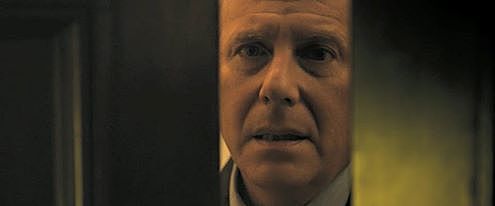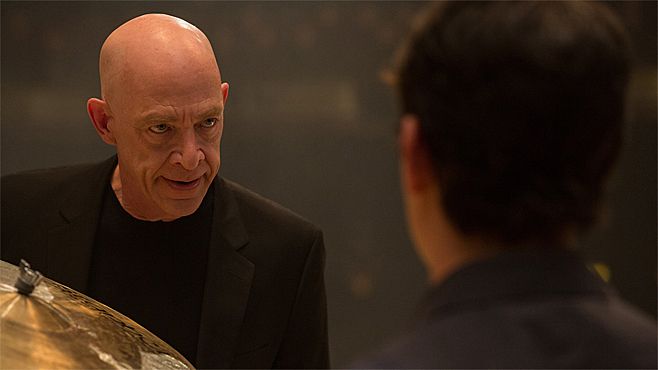Oscar Week: Apt Pupil
Joe Nunweek on Whiplash's cinema of unease
The last ten minutes or so of Damian Chevelle’s Whiplash are absolutely exhilarating, a beat-for-beat syncopation of sound and vision as a student finally gets his mentor to utter two simple words of approval. They’re also thoroughly, exquisitely awful to endure. Plenty of coming-of-age films tend to end on some giant emotional catharsis (Dead Poets Society) or a fumbled moment of reflection (Boyhood), and they’re largely sanguine in the sense that a hot, flush taste of blood in your throat at the end of a long-distance run is sanguine. It should be the taste of success: why, then, does it feel like metallic bile?
Part of it is the film’s ruthless streak – like some squatter in the church of sensitive-boy Miramax indie, Whiplash sets about discarding the sacraments of genre as soon as we’re in its pull. It’s possible to imagine a looser draft in which the early effort drumming first-year Andrew Neiman (Miles Teller) puts into his courtship with Melissa Benoist’s Nicole is given the symmetry of growing commitment, of a separation, and a tentative reconciliation. Instead, she’s discarded halfway through off the back of a couple of casual dates. Neiman breaks it off with an impassioned speech about how he’s got a destiny, how he’s cutting things off before he lets her down or vice versa, and it’s shot with a layer of grim, unsentimental comedy that totally deflates it.
Similarly, we expect Paul Reiser as Neiman’s gentle, doting dad to be a stronger narrative counterpart to JD Simmons’ Tyrants of Jazz hitlist as the monomaniacal Terrence Fletcher - the film resists it. Denied so much as a moment where Simmons and Reiser share the screen, Neiman Sr’s inability to assert himself in life becomes an inability to assert himself on the narrative force of the film (I should note that Reiser’s performance is impeccably-judged and overwhelmingly sad, a supporting role in the most passive sense that hits on what support looks like as an ambitious 19-year-old’s aging father. J.K. Simmons was always going to take away Best Supporting Actor, a critical light finally shone on a hard-as-nails persona he’s perfected for years, but it’s Reiser who still haunts me).
There’s more - an anticipated call-back to a batch of sheet music that goes missing, giving Nieman his break as Fletcher’s core drummer, never happens. As an audience, we’re distantly still on the lookout for it when an entirely different bait-and-switch involving sheet music sends us reeling. And like Black Swan, a film its lurid and bloody status anxiety resembles, there’s a point where everything starts to feel like the stuff of nightmares, where the tension and paranoia spills over into a hallucinatory experience from that car crash on. The off-tempo pacing makes parts of the film feel out-of-step, but as you get to the end, it becomes clear it’s playing a different tune.
But Black Swan matches its ballet source material by going for melodrama in its final moments, and Whiplash elides this for a sort of fevered elation. If it feels wrong and somehow unearned, see how the backstage, the audience, even the faces of the other musicians themselves fade away. We could be in Neiman’s fantasy, or Fletcher’s, or probably both.
None of which would be all that troubling if the film had bothered to humanise or subvert Fletcher. We’re all prepared to be see the gruff, abusive outer layers of the onion peel away and weep involuntarily at a passionate but loveable soul. But Fletcher’s moment of personal tragedy – the death of a former student – is revealed as a selective and self-serving lie, and when he later delivers the nearest this movie has to a rousing bro-intellectual speech on dedication and drive, it’s in the service of a revenge that’s at once very small and very grand.
Fine, then, because movies about mentors who turn out to be assholes should be great reckonings as well – think Wall Street. You’re yearning for Neiman to open his eyes and realise how toxic Fletcher is, especially once he’s expelled from his conservatory. Then that doesn’t happen either – there’s that palpably reluctant scene where he’s persuaded to give testimony to end his tormentor’s career, then inexorably, dreadfully, is reeled back in.
The means and mechanics that Whiplash goes to drive that allure home can be as improbable as it likes, really – never let facts get in the way of a good showdown, I say. But the patriarchal, faintly poisonous desire to ingratiate yourself to a self-styled mentor is real and intoxicating. Worse, it’s irresolute – it doesn’t end in the teacher, lecturer or boss getting a comeuppance, or you necessarily coming to your senses for a long time after. And worse still, despite what we like to tell ourselves and despite some pretty glaring deficits, it can get results.
Let’s start with high school, where I started out pretty good at science under the tutelage of one of the hardest teachers going - a tough, lean man who gave me a sort of grandfatherly charm when he observed we shared the same first name. He allowed us to sit where we wanted to – until the first of what were an astonishing number of regular tests. After each, we would be called one by one (“dumbest to smartest”).
I fared okay for the first three (second-smartest in Astronomy) then I bombed out after a nasty head-cold and a school production to fourth-dumbest in Chemistry. Jittery and embarrassed that morning, I managed to drop and smash a vial of hydrochloric acid. The teacher sneered and “tsk”-ed, then returned with a tank of K-Mart grade ammonia from the back room.
I was springing tears – partly from the acid, partly of embarrassment at the muffled laughter around me. He held the open tank out in front of me.
“Do you know how ammonia works with hydrochloric acid?”
“Um…no…”
“Fourth from the bottom in chemistry? No, of course you wouldn’t. Those of us who can bother to get it together will know that ammonia cancels out hydrochloric acid. Is it irritating you? Do you think a whiff of this will fix it up?”
“I….I…”
“Well we almost had Nunweek huffing ammonia for your amusement, everybody.” The showmanship was always very good. “But I’m not cruel.”
So you imagine how this goes – I hate him, but I want that tiny twinkle of approval again. So I worked my arse off to be a half-way creditable top ten student by the year’s end. Out of his shadow, I was also turned off science through the crucial years when I could have made some life decisions about it.
Most of my interactions like this were in the classroom – I remember the American lecturer I had when I was 19 who told us all degrees from a NZ university meant shit overseas, and that his marking would be a reflection of our true worth. I got grudging, gruff praise and it thrilled me; if I’d spent the time I wasted on that course on my law papers that were run by genial, even-tempered professors, I would have had a lot more that was worth shit overseas.
This is all minor – I feel like I’ve dodged the bullet in my professional working life, under and alongside a succession of people who commanded respect without rationing it out between bouts of fear. But I think of the first-year solicitor I knew who, approaching a senior lawyer about a huge and impenetrable file left on his desk , faced a stony, obstinate grin. “The basic facts about this file are that it’s due on my desk by 3pm.” Unaided and shaken, he managed to muck up in a way that was internally humiliating and externally lucrative (the client was likely charged for a couple of days lost to a hazing ritual).
Or the friends I knew in school who were drilled in hockey by a 26-year old burnout in ever more punishing exercises, catchcries of “faggot” and post-match hits of alcohol and weed under an eye that dared them to wuss out. And so I had friends who were top hockey players at 19, but serious drinking issues on top. Some of the figures that dominated your life once seem ridiculous later on, and some don’t.
All of this is not to pass the buck to the mentor from the ego of any protégé who should know better. Part of thrilling to the end of Whiplash through your eyelids is to watch Nieman to reveal himself to be just as much of an antisocial asshole, to see friends, family and admirers literally melt from view, for all of the “push your limits” stuff to be taken as gospel.
To leave an audience on this sort of dissonance between character of the film and the character of the protagonists is a tricky balance, and to portray the mentor-student relationship as something bitter and twisted is plain unfashionable. Chevelle leaves it all profoundly alienating in what you’d not necessarily call a very Hollywood move (Certainly, a few critics didn’t seem to know what to make of it – here’s Richard Brody of the New Yorker taking the film very literally indeed and making hard work of revealing the Fletcher character’s inaccurate sub-Gladwellisms about jazz heroes to be inaccurate sub-Gladwellisms). Overwritten to get its main digs in, it might be a bit of a one show only affair, but it’s a good one – a vicious dark comedy masked as a sports film about bleeding on kits.


